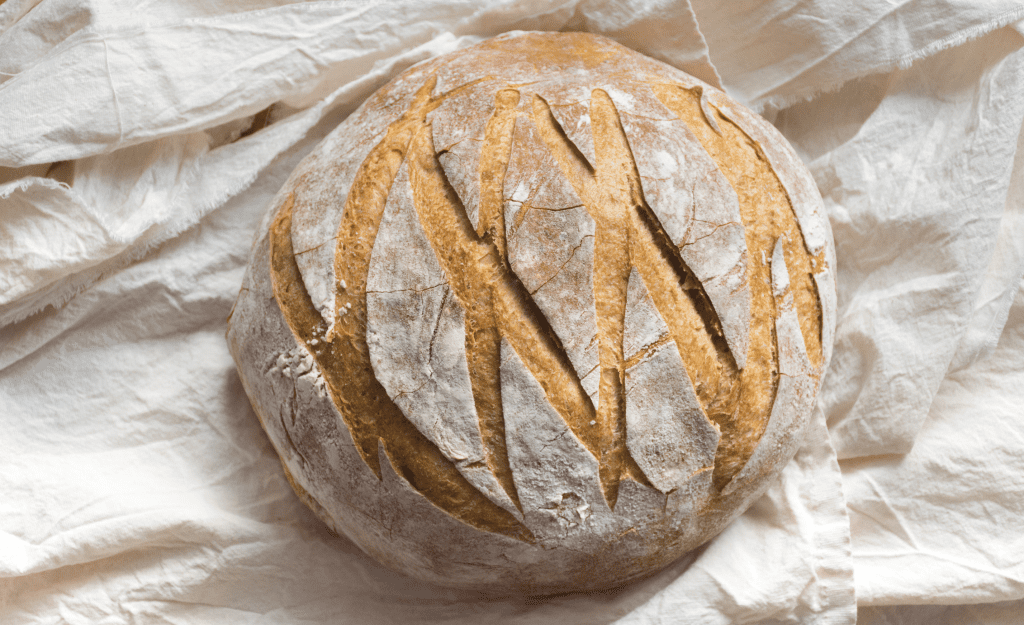The smell of fresh-baked bread wafting from an artisanal bakery is an olfactory symphony, an olfactive tug at our primitive instincts, but nothing resonates quite like the robust aroma of sourdough. Sourdough bread isn’t just the rustic, tangy, crusty loaf you add to your breakfast table; it’s an emblem of counterculture, a symbol of culinary rebellion that aligns seamlessly with the hipster spirit and punk rock ethos. It’s a bread that has undergone a renaissance, rising like a phoenix from the floury ashes, taking center stage in Canadian direct-to-consumer markets.
Living on the cusp of tradition and innovation, sourdough embodies the “badass” element through its historical resilience. It’s a bread with a past as rugged as a leather-jacketed punk rocker, dating back thousands of years, the fermentation process a survivalist trick born of necessity. Yet, like an indie band releasing their music on vinyl in a digital era, sourdough remains fiercely traditional, maintaining its core identity in a world of rapid bread-making methods and processed food.
In this age of conscious consumerism and mindful living, sourdough is the gastronomic equivalent of a thrift store gem – an emblem of quality, authenticity, and resilience. The inherent connection between the hipster subculture and sourdough is, in essence, a shared penchant for rejecting the mainstream. Like vintage fashion and vinyl records, sourdough is about rejecting the convenience of the mass-produced in favor of an ode to authenticity and the charm of hands-on creation.
The revival of this ancient baking tradition in the digital landscape is akin to the punk rock movement’s audacious rebellion against commercial music. But it’s not all about contrarianism. The advent of direct-to-consumer sales online in Canada has democratized access to this artisanal bread, giving a figurative stage dive into the crowd of ardent fans ready to catch and consume it. Canadian households from Vancouver to Halifax can now experience the defiantly different taste of sourdough, conveniently delivered straight to their doorsteps.
But there’s more to the insurgent rise of sourdough than just its counterculture appeal. It’s not just the rebel of the bread world; it’s also the health guru. With its longer fermentation process, sourdough bread promotes better gut health, which has a profound impact on overall wellness. The wild yeast and lactobacillus in the sourdough starter work to pre-digest the starches in the bread, making it easier for our bodies to absorb and reducing the possible bloating effect. And then there’s the lower glycemic index, making it an ally in maintaining healthy blood sugar levels. So, you see, it’s not just a revolution; it’s an evolution – an evolution of how we perceive health, taste, and value in our daily bread.
At its core, sourdough is essentially a testament to the beauty of simplicity, embodying a form of ‘minimalist baking’. Its creation demands little more than flour, water, time, and the fostering of naturally occurring wild yeasts. Baking sourdough bread at home is as straightforward as the three-chord anthems of punk rock, shunning the flashy equipment and fancy ingredients of commercial bread production. It offers an avenue for self-expression, a chance to turn your kitchen into a stage where you’re the lead performer, rolling up your sleeves to unleash your culinary creativity.
Indeed, the basics of sourdough bread making are deceptively simple: a sourdough starter (a fermented mixture of water and flour that serves as a natural leavening agent), flour, water, and salt. It’s the sort of rogue DIY spirit that would make Sid Vicious proud. A mixing bowl, a dough scraper, a kitchen scale, a proofing basket, a Dutch oven, or a baking stone, and you’re ready to start your baking gig.
As such, embracing the ‘sourdough revolution’ is like strumming your first power chord. It’s a culinary statement, a self-sufficient act of making something uniquely yours from basic, raw ingredients. It’s a nod to the artisan within us, the punk rocker who seeks authenticity in an increasingly commercial world. So, go on, join the cultural resurgence of sourdough baking. It’s the rebellious, healthy, cost-effective choice that’s as punk rock as bread gets.
Benefits of Sourdough Bread for Hangovers and Dehydration
Heads up, you rebels, misfits, and renegades! We’ve spent this entire article exploring the rebellious spirit of sourdough, and if you’ve survived a night of beer, mosh pits, and slam dancing, it’s time to embrace this unique bread as your morning-after hero.
Liquid Punk: Sure, sourdough ain’t a pool of hydration itself, but it’s your rad ally in a dehydration desert. Have it with a side of water, and it’ll fill up your stomach like a solid bassline, encouraging you to rehydrate at a pace that’s more slowcore than hardcore.
The Vitamin Rebellion: Booze, that sweet siren, can make your body evacuate important nutrients like it’s fleeing a burning venue. Enter sourdough, the countercultural hero, packing punches of B vitamins and magnesium, ready to replenish what you lost in the slam pit of booze.
Anarchy in the Blood Sugar: The alcohol anarchists can wreak havoc on your body’s blood sugar levels, making you feel like a trash heap. But sourdough, especially the whole-grain variety, regulates the sugar rush, distributing glucose slowly and steadily, just like the consistent thump of a punk rock drumbeat.
Gut-Riot: Those badass probiotics that help ferment the dough might just help settle your punk-rock gut. Sure, baking might’ve ended their riot, but their remnants could still help soothe your belly, like the calming sound of an acoustic set after a loud gig.
Remember, punk’s not just about the attitude, it’s about staying alive to fight another day. Sourdough, in all its funky, fermented glory, might not replace a serious crash on the couch or a hardcore hydration session, but it’ll sure help you crawl out of bed and get back in the mosh pit.





















